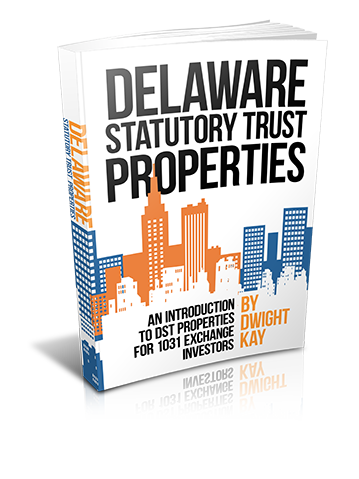DST 1031 Exchange: What is it and how might it help with my current 1031 Exchange?
By Dwight Kay | KPI1031.com
 So you’ve decided to do a 1031 exchange, meaning you have decided to sell your property and invest that money in another property in order to defer the federal capital gains tax, state capital gains tax, depreciation recapture tax and the Medicare surtax. Smart!
So you’ve decided to do a 1031 exchange, meaning you have decided to sell your property and invest that money in another property in order to defer the federal capital gains tax, state capital gains tax, depreciation recapture tax and the Medicare surtax. Smart!
But are you just moving from one headache to another? If you’re looking to retire from property management but you still want to defer your taxes using a 1031 exchange and keep your invested money working for you, you might be interested in learning about a DST.
DST stands for Delaware Statutory Trust. Here’s the full technical definition: a separate legal entity established under a trust created for the purpose of holding, managing, administering, investing, or operating a property, or for allowing business/professional properties to have multiple trustees where each owner has beneficial interest for federal tax income purposes and every owner gets an undivided fractional interest in the DST property. These properties are not limited to the state of Delaware, but the idea of a DST was created under Delaware law.
Let us decode that for you. A DST allows each investor to own a fractional interest in a property with other investors, not as limited partners, but as his or her own individual owner inside the trust. Everyone will receive his or her own percentage share of the potential income, tax benefits, and potential appreciation of the whole property. Each owner is treated as owning an undivided fractional interest.
This structure of ownership allows the minimum investment to often be as low as $100,000, allowing investors to not only be able to invest in properties that can be too expensive to purchase individually (like large multifamily apartment communities, office buildings, industrial properties, single tenant net lease retail, self-storage facilities, and medical offices), but to invest their money into multiple properties, diversifying their real estate portfolios with properties that are professionally managed.
So if you invest in a DST as your replacement property during a 1031 exchange, you can be a passive investor (no more calls about the toilet clogging or cockroach infestations) and diversify your real estate portfolio by being able to put the money from your sold property into multiple properties. Not only will you be free from management responsibilities, you can have a fractional ownership interest in multiple properties (for example instead of buying one apartment building or one single tenant net lease building you are now able to own an interest in thousands of apartment units throughout the country and an interest in a multi property portfolio of single tenant net lease buildings), letting your investment work for you while you take a step back and enjoy your newly found free time.
If you are trying to do a 1031 exchange, you might also be in a “time crunch” due to the 45-day identification period. If you decide to invest in a DST property for your exchange, you can close on your DST replacement properties typically between three to five business days of completing and returning the subscription documents. DST property investments are able to close quickly, due to the properties being pre-packaged and ready-to-go, saving investors from missing the deadline to defer the capital gains tax.
In order to effectuate a 1031 exchange, you need a Qualified Intermediary (also known as QI) to facilitate the exchange. A QI is an independent third party who will hold the proceeds and will be a part of enacting the 1031 exchange through purchasing the replacement property. That’s where Kay Properties comes in. We provide DST properties that have passed our due diligence program and connect you with the properties that make sense for each investor’s situation. We work with our clients to extensively review different DST sponsor companies, DST investments, real estate asset classes, locations, the use of debt vs. all-cash/debt-free real estate, etc. For more details on 1031 exchanges, DSTs and the Kay Properties process, please register at www.kpi1031.com or contact your Kay Properties representative.
There are a number of potential benefits of exchanging into a DST property, but it is important to note that these should be carefully weighed with the potential risks outlined below. You should also read in detail the risk section in the offering materials of each DST 1031 property prior to investing for a full understanding of each DST investments business plan and risk factors.
Dwight Kay
CEO and Founder
Dwight Kay is the Founder and CEO of Kay Properties and Investments, LLC (Kay Properties). Kay Properties is a provider of DST brokerage and advisory services headquartered in Los Angeles, CA with an office in New York, NY. Registered Representatives at Kay Properties and Investments specialize in helping 1031 exchange clients throughout the country purchase DST properties and are securities licensed in all 50 states, Washington D.C. and the U.S. Virgin Islands. Mr. Kay has personally been involved in over $200,000,000 of client purchases of DST properties and other securitized real estate products.
 Dwight is a published author with multiple published white papers and articles on 1031 exchanges, Delaware Statutory Trust (DST) properties and real estate securities. He has been interviewed on local and nationally syndicated radio stations on the matters of 1031 exchanges and replacement properties. He also is the author of the published book “Delaware Statutory Trust (DST) Properties: An Introduction to DST Properties for 1031 Exchange Investors.”
Dwight is a published author with multiple published white papers and articles on 1031 exchanges, Delaware Statutory Trust (DST) properties and real estate securities. He has been interviewed on local and nationally syndicated radio stations on the matters of 1031 exchanges and replacement properties. He also is the author of the published book “Delaware Statutory Trust (DST) Properties: An Introduction to DST Properties for 1031 Exchange Investors.”
Dwight began his career in commercial real estate working for a national commercial real estate brokerage firm focusing on multifamily and commercial real estate. Mr. Kay received his Bachelors in Business Administration from Point Loma Nazarene University in San Diego, California, and successfully obtained his Series 7, 22, and 63 securities licenses as well as a real estate broker’s license.
There are material risks associated with investing in real estate, Delaware Statutory Trust (DST) properties and real estate securities including illiquidity, tenant vacancies, general market conditions and competition, lack of operating history, interest rate risks, the risk of new supply coming to market and softening rental rates, general risks of owning/operating commercial and multifamily properties, short term leases associated with multi-family properties, financing risks, potential adverse tax consequences, general economic risks, development risks and long hold periods. There is a risk of loss of the entire investment principal. Past performance is not a guarantee of future results. Potential cash flow, potential returns and potential appreciation are not guaranteed. For an investor to qualify for any type of investment, there are both financial requirements and suitability requirements that must match specific objectives, goals and risk tolerances.
Diversification does not guarantee returns and does not protect against loss. This material does not constitute an offer to sell nor a solicitation of an offer to buy any security. Such offers can be made only by the confidential Private Placement Memorandum (the “Memorandum”). Please be aware that this material cannot and does not replace the Memorandum and is qualified in its entirety by the Memorandum. Please read carefully the Memorandum and/or investment prospectus in its entirety before making an investment decision. Please pay careful attention to the “Risk” section of the PPM/Prospectus. All photos are representative of the types of properties that Kay Properties has worked with in the past. Investors will not be purchasing an interest in any of the properties depicted unless otherwise noted.
This material is not intended as tax or legal advice so please do speak with your attorney and CPA prior to considering an investment. This material contains information that has been obtained from sources believed to be reliable. However, Kay Properties and Investments, LLC, WealthForge Securities, LLC and their representatives do not guarantee the accuracy and validity of the information herein. Investors should perform their own investigations before considering any investment.
IRC Section 1031, IRC Section 1033, and IRC Section 721 are complex tax codes; therefore, you should consult your tax and legal professional for details regarding your situation. Securities offered through registered representatives of WealthForge Securities, LLC, Member FINRA / SIPC. Kay Properties and Investments, LLC and WealthForge Securities, LLC are separate entities.
DST 1031 properties are only available to accredited investors (generally described as having a net worth of over one million dollars exclusive of primary residence) and accredited entities only (generally described as an entity owned entirely by accredited individuals and/or an entity with gross assets of greater than five million dollars). If you are unsure if you are an accredited investor and/or an accredited entity, please verify with your CPA and Attorney prior to considering an investment. You may be required to verify your status as an accredited investor.
Tags: DST 1031 Exchange, Dwight Kay




